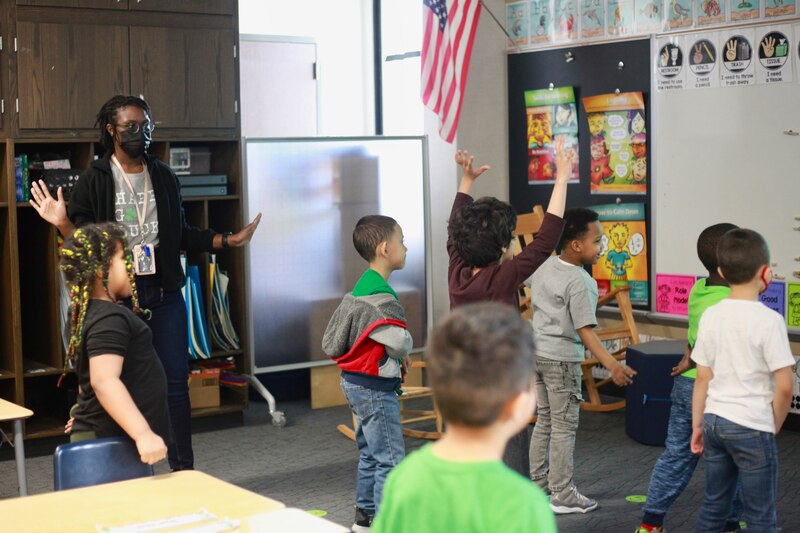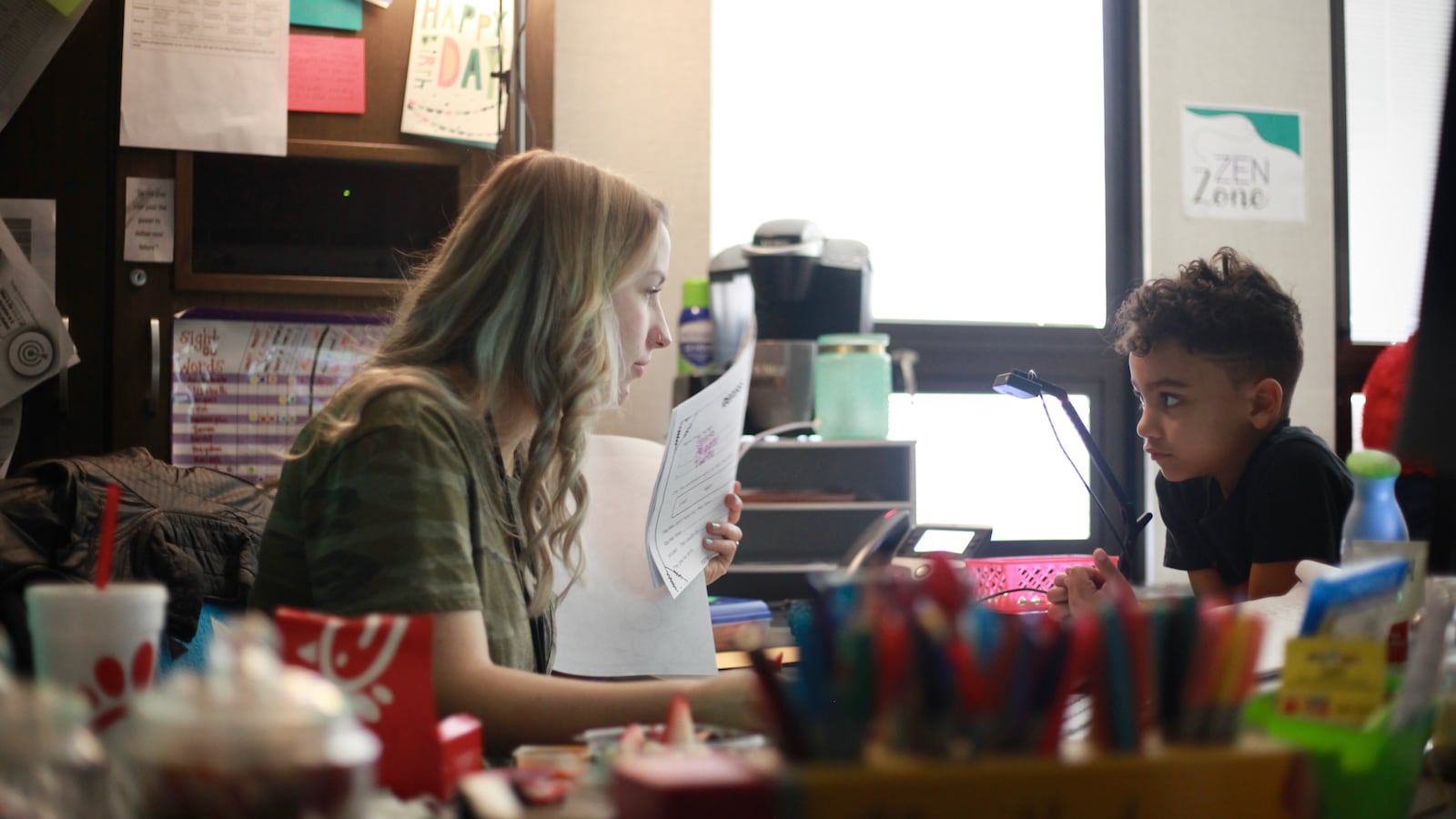The last lesson that Alexis Kashman taught before COVID closed her classroom was fractions, with her students making diagrams out of tape on the floor.
A recent college graduate, she had started her teaching career at Chapel Glen Elementary School in Wayne Township just three months earlier, and found herself going back to her textbooks to translate the fraction lesson for remote learning.
“We were taught the most important thing is to gather your kids at the carpet and read to them,” she said. “And then as soon as I started, the pandemic hit and everything I had learned up until that point, we had to throw it out the window.”
After two years of disrupted lessons, Kashman has come full circle as Indiana schools return to a pre-pandemic state, with no masking, distancing, quarantining, or — teachers hope — major upheavals midway through the year.
For veteran teachers and older students, this is a return to normalcy. But for some young students and new teachers like Kashman, this is among the first times they’ve experienced in-person learning without restrictions or interruptions. And schools like Chapel Glen are tasked with helping both groups adjust.
The solutions range from a mentorship program for new teachers, to incorporating new and old-school learning strategies, to practicing patience and experimenting with new ideas.
“We all have learned that we really can do hard things,” said Principal Shatara Smith. “When we think outside the box, and we come together and problem solve, it’s not as bad as you think.”
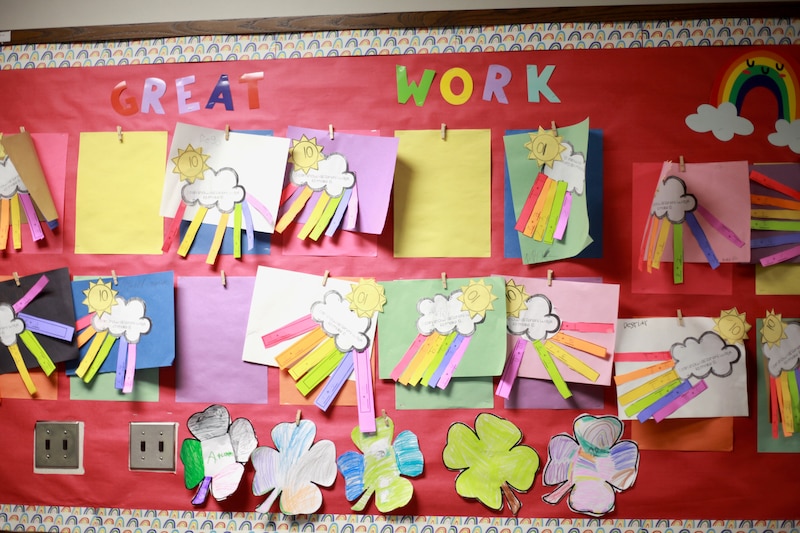
Learning classroom expectations
Like schools across the country, Chapel Glen closed and reopened several times over two years as it weathered COVID cases and shifting health guidelines.
During building closures, the Indianapolis district offered an online program where teachers taught alone from their classrooms while students followed along at home.
Alexandra Offutt, who started at Chapel Glen teaching virtual students, described her first few months as a little lonely.
When teachers and students were able to return to their classrooms, they found changes. Gone were the staples of elementary education, like circle time and morning high-fives, replaced by spaced-out desks and elbow bumps.
Offutt’s students had to remain in pods, spending their day doing activities with the same four or five peers in order to aid in contact tracing. Masking and distancing made critical early literacy lessons a challenge, especially for students who were learning English as a second language.
“For kindergarten, it’s hard because you’re learning how to form your mouth when you’re learning these letters,” Offutt said.
“We’d have to be like, alright, back up and pull your mask down and tell me what you’re saying,” Kashman said.
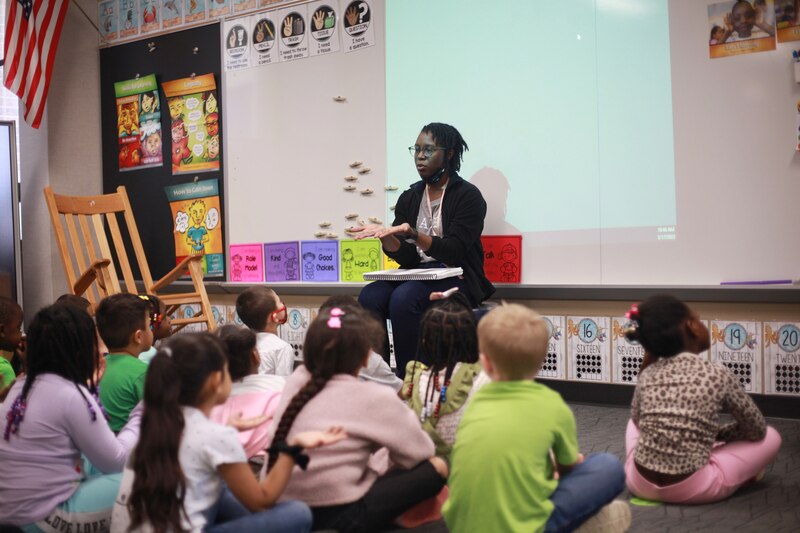
Simultaneously, students also had to learn stamina, focus, and interpersonal skills that had fallen by the wayside during at-home learning. And once the school went mask-optional, Offutt also had to teach students to respect their friends’ choices to wear a mask or not.
“How you speak at home is not necessarily how you can speak at school,” Offutt said. “And you can’t just bump and push and grab something, because you’re going to hurt another kid if you do that.”
Now, with restrictions lifted, Offutt’s kindergartners took advantage of their freedom to move around the room with their friends on Thursday, while dancing to a St. Patrick’s Day song.
Then Offutt gathered them on the rug to sound out words. On “cove,” some students made the leap to a more familiar word.
“No, not COVID,” Offutt said.
“Ewww,” the students said.
Teachers learn from each other
Chapel Glen’s newest teachers are also learning the ropes.
The school’s mentorship program, dubbed the New Teacher Academy, matched new teachers to veteran ones in an effort to ease them into the school and the expectations of teaching in-person, said Smith, the principal.
“Many of our new teachers not only started remotely, but had their student teaching practicum remotely,” Smith said. “Looking at classroom management, procedures, a lot of the necessary foundational things that are needed for starting, we thought, ‘How can we help address some of these areas of concern?’”
But mentees noted the pandemic has also led to a two-way street with mentors, whom they may not have met otherwise.
“I’m helping a veteran teacher create an assignment online, but the veteran teacher is helping me figure out what’s going to work for one of my specific learners,” Kashman said.
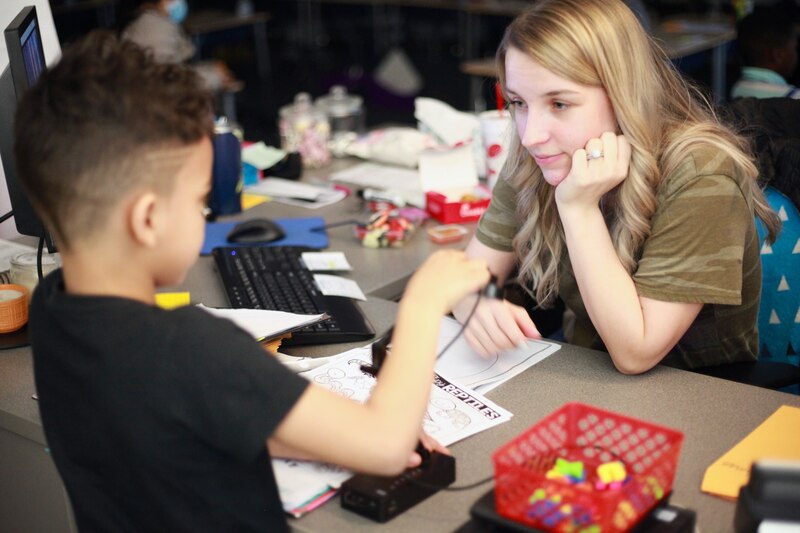
The way forward likely combines the experiences of both new and veteran teachers, as they all work to address the skills that lapsed during the pandemic.
Teachers of all types are grappling with helping fourth graders who may read at a first-grade level, said Megan Graybosch, a reading interventionist and mentor.
“There’s probably some hesitancy to want to pick up a book that they know they can be successful with,” Graybosch said. “Those books may not look like what their peers are reading.”
Graybosch said she helps new teachers consider how to incorporate “old-school” activities into 21st-century classrooms.
Time-tested strategies like small group reading and rotating centers can supplement the online curriculum and personalized lesson plans that have come to define pandemic learning, she said.
There are other pandemic-inspired changes that the school would like to keep as it steadily returns to normal.
Virtual parent-teacher conferences and drive-thru awards ceremonies are here to stay by popular demand, Smith said.
All Chapel Glen students now have a tablet or laptop, and spend some time each week refreshing the skills they had to learn during virtual schooling.
“I joked that they have trouble holding a pencil, but man, they can cut and paste, they can upload documents,” Smith said. “The skills that we may have introduced them to probably a little later, they were introduced to and did really well.”
Preparing for the future of the pandemic
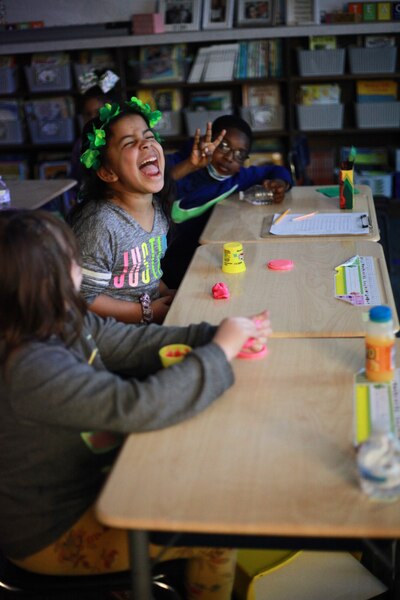
As Kashman prepared to send her first graders to recess on Thursday, an unexpected announcement came over the school’s public address system: Recess would be held indoors due to lingering smoke from a nearby fire.
Kashman pivoted, offering Play-Doh, coloring pages, and time to watch “The Secret Life of Pets,” conscious that her students would be spending their whole day indoors.
“They’ll get antsy by the end of the day,” she said.
Her students said they didn’t mind staying inside.
“Because you get sweaty outside, and I don’t want to get sweaty,” one student, Aaliyah, said.
It’s difficult to predict how COVID will affect schools in the future, but it will likely involve a series of adjustments.
Principal Smith said Chapel Glen has plans in place for future school closures, whether due to COVID, snowstorms, or other unforeseen circumstances. After two years, her staff feels more prepared to weather uncertainty, she said.
With case counts low, and pandemic protocols over, teachers feel cautiously optimistic about the next school year, said Graybosch, the reading interventionist.
“I’m no virologist,” she said, to laughs from her peers. “But I think next year is looking pretty good.”
Aleksandra Appleton covers Indiana education policy and writes about K-12 schools across the state. Contact her at aappleton@chalkbeat.org.
